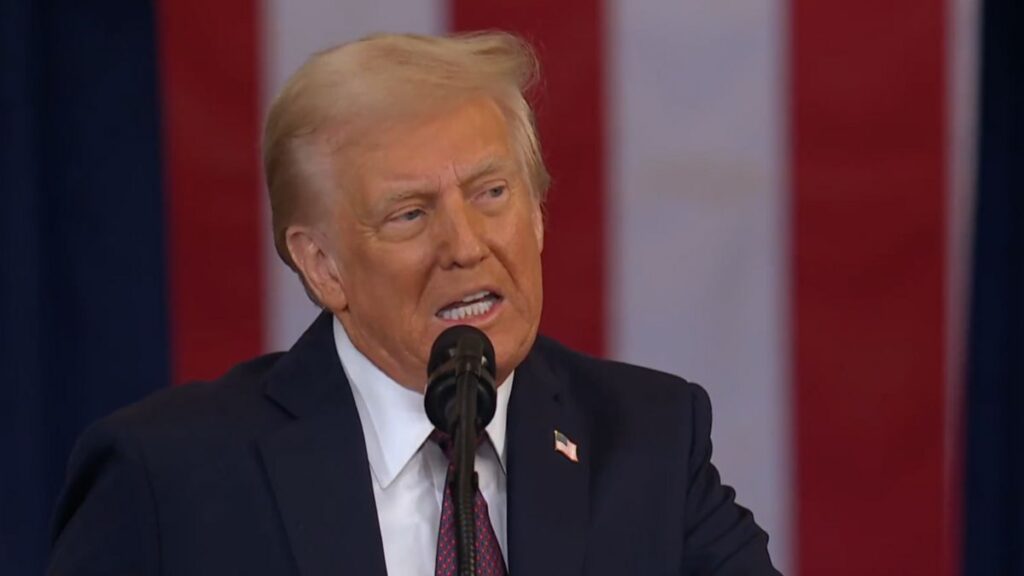US President Donald Trump’s assertion that the US carried out a successful airstrike on three of Iran’s nuclear facilities marked a significant escalation. Trump claimed in a post on Truth Social that all planes returned safely after American fighter jets hit the nuclear sites at Fordow, Natanz, and Isfahan.
Although the announcement generated a lot of buzz around the world, it also caused a political uproar in the US. Now, lawmakers and legal experts are wondering if Trump had the constitutional right to attack without the consent of Congress.
What Did Trump Say?
Trump posted:
“We have successfully completed a major strike on Iran’s nuclear facilities — Fordow, Natanz, and Isfahan. All aircraft have exited Iranian airspace. Full bomb load was dropped on the Fordow site. All jets are returning safely. Congratulations to our brave American warriors. No other military in the world could have done this. Now is the time for peace!”

Can a US President Order Military Attacks Alone?
Although the President of the United States has considerable military authority under the Constitution, this authority is limited. As Commander-in-Chief of the Armed Forces under Article II, the President has the authority to issue limited military orders, particularly in times of emergency.
However, Congress usually has to approve the start of lengthy or extensive military operations. Laws like the War Powers Act of 1973 are used to maintain this balance of power.
War Powers Act: What It Says
The War Powers Act was designed to prevent unilateral military action by the President. Here’s what it requires:
| Provision | Requirement |
|---|---|
| Notification | President must notify Congress within 48 hours of launching military action |
| Time Limit | Action must cease within 60 days unless Congress authorizes it |
| Withdrawal Period | President has an additional 30 days to safely withdraw troops if authorization is not granted |
Why Trump’s Move Is Under Fire
A video of Vermont Senator Bernie Sanders reacting to Trump’s post has gone viral on X (formerly Twitter). In the video, Sanders reads Trump’s announcement and firmly declares:
“Donald Trump has no authority to launch a military strike on Iran without Congressional approval. That power lies solely with Congress.”
The crowd in the video echoes his sentiment, cheering in agreement. This incident has reignited the debate over presidential war powers and constitutional overreach.
Has This Happened Before?
Indeed. During his presidency in 2020, Trump, again without the consent of Congress, ordered a drone strike that killed Iranian General Qasem Soleimani. There was a lot of opposition to that decision, particularly from Democratic lawmakers.
Trump has frequently made executive decisions without consulting Congress, which his detractors claim threatens the checks and balances that are the cornerstone of American democracy.
Is This Legal Under International Law?
Beyond US laws, international law also limits when and how a country can use military force. According to the United Nations Charter:
- Countries can use force only in self-defense or with Security Council authorization.
- Preemptive strikes without clear imminent threat or UN approval may violate international law.
If Trump’s latest actions were not in response to an immediate threat, they could be seen as breaches of both US constitutional law and international legal standards.
What Happens Next?
As legal challenges and Congressional investigations loom, this strike could have far-reaching consequences. It not only affects US-Iran relations but may also shape the powers future presidents have over military decision-making.
Expect heated debates, Congressional hearings, and possible court battles in the coming days.
Summary
| Key Point | Explanation |
|---|---|
| President can act without Congress? | Yes, but only in emergencies or limited actions |
| War Powers Act limits? | Must notify Congress in 48 hours, seek approval within 60 days |
| Trump informed Congress? | Not yet clear; if not, it may violate US law |
| International legal status | Questionable if not in self-defense or approved by the UN |
| Historical context | Similar controversy occurred after Soleimani’s killing in 2020 |
Read More: Iran Vows Revenge: Will Superpowers Like China and Russia Join the War?
Watch India Pakistan Breaking News on The Ink Post. Get Latest Updates, Latest News on Movies, Breaking News On India, World, Explainers.
Follow us on Facebook and Instagram and LinkedIn and Twitter to Stay updated!






